GENEVA, 23 MARCH – This year’s World Water Day and World Meteorological Day are therefore both dedicated to Climate and Water. One of the underlying themes is that we can’t manage what we don’t monitor and measure – a message which has become unfortunately too familiar in the ongoing COVID19 pandemic.
One of the biggest impacts of climate change is on water, which in turn affects sustainable development and security. But in contrast to internationally coordinated information about rising temperatures, data on water resources is patchy and incomplete. By uniting the two international observances, which fall on 22 and 23 March respectively, the aim is to raise the profile of water in the climate debate. Given the ongoing Coronavirus pandemic, there will be no official ceremonies and activities to mark the 70th anniversary of WMO will take place later in the year. World Meteorological Day showcases the essential contribution of National Meteorological and Hydrological Services to the safety and wellbeing of society. This work continues 24/7 despite the challenges and constraints of the pandemic.
”We feel the effects of climate change mostly through water: more floods, more droughts, more pollution. Just like viruses, these climate and water-related shocks respect no natural boundaries,” said WMO Secretary-General Petteri Taalas. ”The world needs to demonstrate the same unity and commitment to climate action and cutting greenhouse gas emissions as to containing the Coronavirus pandemic”, he said.
”Changes in the global distribution of rainfall are having a major impact in many countries. Sea levels are rising at an increasing pace, driven by melting of the largest glaciers, like in Greenland and Antarctica. This is exposing coastal areas and islands to a greater risk of flooding and the submersion of low-lying areas”, said Mr Taalas.
Every drop counts
Water is life. On average, a human being cannot survive more than three days without water. Amid the COVID-19 pandemic, an estimated 3 billion people worldwide lack basic handwashing facilities. Over two billion people live in countries experiencing high water stress, while around four billion people face severe water scarcity for at least one month every year. By 2050, the world’s demand for fresh water will be 20 to 30% higher than it is today. Most rivers and freshwater bodies are transboundary, and decisions by one country on water resource management often have implications for other countries, thus making water a potential source of both peace and conflict.
According to the climate statement, more than 6.7 million new internal disaster displacements were recorded between January and June 2019, triggered by floods and tropical cyclones in Southeast Africa, South Asia and the Caribbean. This number was forecast to reach close to 22 million in 2019, up from 17.2 million in 2018. Of all natural hazards, floods and storms contributed most to displacement.
World Meteorological Day takes place every year on 23 March and commemorates the coming into force on 23 March 1950 of the Convention establishing the World Meteorological Organization. It showcases the essential contribution of National Meteorological and Hydrological Services to the safety and wellbeing of society and is celebrated with activities around the world. The themes chosen for World Meteorological Day reflect topical weather, climate or water-related issues.

